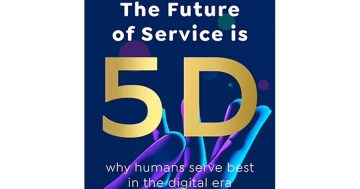
While the predictable, routine and process elements of roles will be automated or done by robots in the future, what can’t be automated are relational, emotional and leadership skills. Photo: iStock.
Michelle Gibbings’ frustrations with supermarket self-service checkouts led her to ponder just how far technology will intrude into the workplace, and whether we are losing the human-to-human equation.
I am happy to admit I have a troubling relationship with self-service checkouts.
As the machine yells at me for the 10th time: ‘’Unexpected item in the bagging area’’, I think, yes, there is something unexpected in that bagging area – my heart and soul. Curiously, I watched the other day as people went to self-service despite the fact there were free staff on the checkout counters.
So accustomed to there being no-one to help, their default is now self-service rather than engaging with a human. Across the workplace landscape, we hear so much about our technological future, but in this race are we losing the human-to-human equation?
Organisations are rushing to adopt artificial intelligence, particularly the tools available from the large language models. These tools are remarkable, but they come with ethical challenges, and leaders need to be conscious and deliberate about their choices. Fear of missing out is not a strategic reason for adopting AI technology, and just because you can doesn’t mean you should.
The 2017 McKinsey Global Institute Report surveyed 46 countries and found that less than 5 per cent of occupations could be fully automated, but about 60 per cent could have at least 30 per cent of their activities automated. They concluded that most jobs would change in some way.
Jump ahead to today, with the rapid advance of AI exposing large swaths of the workforce to disruption due to the ability to automate non-routine tasks.
The World Economic Forum’s Future of Jobs Report (2023) outlined how 43 per cent of work tasks will be automated, and a quarter of jobs will change by 2027. Research by Professor Ed Felten and colleagues at Princeton University ranked occupations based on their potential to be disrupted by AI.
Their findings reinforced the message that any process-based tasks could be automated, showing that the professions with the least to fear involved movement and service – for example, dancers and many trades.
Sam Altman, who started the Open AI company, says all repetitive work that does not require human emotional connection is likely going to be at least greatly supplemented by machine learning. It’s unsurprising, consequently, that we hear a lot about the future being all about
science, technology, engineering and maths (STEM), but it’s never that simple. We must remember the human-to-human equation.
While the predictable, routine and process elements of roles will be automated or done by robots, what can’t be automated are relational, emotional and leadership skills. Social-emotional skills are already in high demand, and there are many instances where they are missing or not given enough emphasis.
This new digital and automated world is shifting emphasis on skills and capabilities. It prizes curiosity, creativity, problem-solving, initiative, adaptability and EQ. Some of the fastest-growing occupations require higher cognitive capacity and explicit social-emotional skills. Consequently, having strong self-awareness and emotional intelligence is just as important as technical skills.
A critical element for leaders is deliberately deciding how to use technology to elevate productivity while maintaining the human element. They should identify repetitive and time-consuming tasks that can be automated using technology, freeing team members to focus on more strategic and value-added work.
Workflow and processes should be streamlined through digital automation, eliminating bottlenecks and reducing manual errors. As part of this, team members should be encouraged to stay abreast of emerging technologies and trends, with opportunities provided for experimentation and innovation. Technology can’t replace connection. At our core, humans need connection, community and collaboration to survive.
Johann Hari’s excellent book Lost Connections: Uncovering the Real Causes of Depression and the Unexpected Solutions is a stark reminder that, as humans, we crave connection. Without connection, we feel lost and isolated, impacting our mental health and wellbeing.
For an organisation to thrive, the human-to-human equation must be prioritised. Here are a few strategies to strengthen this crucial aspect.
- Cultivate a human-centric work culture by prioritising employee wellbeing, mental health, and work-life balance. A supportive and inclusive work environment fosters interpersonal connections and encourages people to do their best.
- Invest in emotional intelligence training because it equips employees with the skills to understand and connect with others. It can help build stronger teams, improve leadership effectiveness, and enhance client interactions.
- Encourage collaboration across different teams to break down silos, promote knowledge-sharing, and enable a diverse range of perspectives to come together for innovative problem-solving.
The central question for leaders to ponder is how they are ensuring they’re making wise decisions about AI’s use and continuing to ensure that their workplace isn’t losing its heart and soul.
Michelle Gibbings is a Melbourne-based workplace expert and an award-winning author. She’s on a mission to help leaders, teams and organisations create successful workplaces – where people thrive and progress is accelerated. She can be contacted at [email protected].











